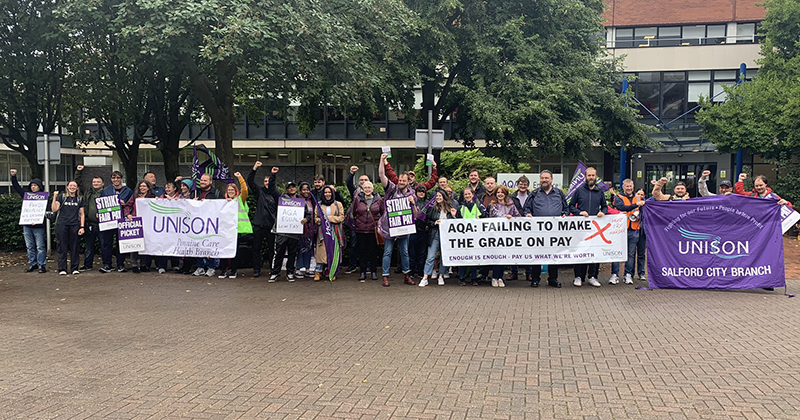Staff at the country’s largest exam board AQA are planning a second strike days before A-level results over a pay dispute.
Unison have called industrial action from August 12 to 15 – the weekend before the first exam results are released on August 18.
It follows a 72-walkout last weekend by workers, including those who help organise the awarding of grades, the union said.
AQA has now accused Unison of attempting to “disrupt” awarding and grading meetings during the strike.
Unison and Unite have rejected a 3 per cent pay increase plus a £500 payment for staff, claiming the charity is “failing its staff and pupils by holding down pay”. AQA says the average pay increase is 5.6 per cent.
The union warned the strikes could delay exam results, but AQA insist there has been no impact as they have “robust plans in place”.
Vicky Knight, Unison north west regional manager, said AQA was “refusing to engage with its staff who are now left with no other choice but to take further days of action”.
“The ball is now entirely in AQA’s court. Disruption can be avoided but only if the exam board does the right thing, starts talking about pay again and gives its employees the wage rise they deserve.”
Unison, which represents around 180 AQA staff, said in June that 71 per cent of those who voted in a recent ballot supported industrial action. A turnout threshold of 50 per cent, needed to win ballots for strike action, was also reached, the union said.
AQA say 79 staff took part in strike action last Friday – 4 per cent of the total workforce.
A spokesperson said Unison “attempted to disrupt our awarding and grading meetings held last weekend and failed”.
In response, the union said strikes “only take place when employees are left with no other option”, adding: “If exam board managers want to avoid further disruption, they need to start talking to staff and their union again about pay, and show they understand the extreme financial strain many are under.”
AQA said it was offering an “affordable” pay rise higher than many other organisations, with the average pay increase standing at 5.6 per cent – as staff will also receive the pro rata £500 payment. Those below the top of their bands will see incremental increases.
It had “robust plans in place” to ensure the next strike will not delay exam results, adding: “Our priority is always to make sure students get the results they deserve on time.”
















Your thoughts